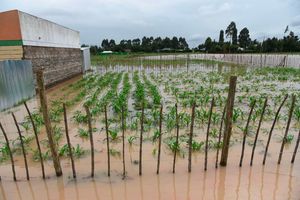MP warns of toxic maize in the market
What you need to know:
- The chairman of the parliamentary committee on agriculture, Mr John Mututho, said there was ample evidence indicating aflatoxin-contaminated maize was being imported into the country but that there was official laxity to investigate the matter.
- Aflatoxin, which develops in maize that is stored beyond the required moisture content, is a chemical that has been blamed for development of cancerous cells in humans.
- The MP claimed he had reported the matter to senior detectives at the Coast, the entry point of the alleged contaminated maize but he was being taken round in circles.
Kenyans could be faced with serious health complications due to allegations that some maize millers and feed manufacturers use contaminated grains.
The chairman of the parliamentary committee on agriculture, Mr John Mututho, said there was ample evidence indicating aflatoxin-contaminated maize was being imported into the country but that there was official laxity to investigate the matter.
“Officers from Kebs (Kenya Bureau of Standards) should not only be sent home but to prison as well,” he noted. Mr Mututho accused Kebs of failing to check the quality of maize imported into the country.
Aflatoxin, which develops in maize that is stored beyond the required moisture content, is a chemical that has been blamed for development of cancerous cells in humans.
The MP claimed he had reported the matter to senior detectives at the Coast, the entry point of the alleged contaminated maize but he was being taken round in circles.
It is not the first time that the Naivasha MP is raising the red flag over the importation of contaminated maize. (READ: Genetic maize seeds set for Kenyan market)
In 2010 he raised the flag on the importation of a consignment of maize from South Africa which had moisture content beyond 14.2 per cent and was prone to developing aflatoxin.
He alleged that the consignment was released from the Mombasa Port and found its way into government granaries.
He said the toxic maize was traced to National Cereals and Produce Board (NCPB) silos in Nakuru, and released for public consumption despite the MP’s protests.
Efforts to get a comment from the Agriculture ministry were futile.
Mr Mututho also said he would soon expose a milk company that was allegedly selling poisonous milk, suspected to have been infected with aflatoxin from contaminated animal feed.
The MP was speaking at a forum in Nairobi to find ways of boosting food security.
The chairman of Cereal Millers Association, Mr Diamond Lalji, said his milling plant had rejected a consignment of maize from a neighbouring country after it was found to be contaminated.
“Two months ago we rejected maize from a neighbouring country after we found it to contain aflatoxin,” he said.




